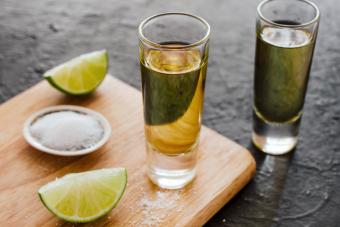
My early experiences of tequila and mezcal came in college — which means I drank the cheap stuff. During that time, I thought mezcal was just cheap tequila with a worm in it, which couldn't be further from the truth. There are cheap and premium versions of both of these agave spirits, and I love each for sipping solo or mixing in drinks. Here's what you need to know about mezcal and tequila.

All Tequila Is Mezcal, but Mezcal Isn't Always Tequila
All tequila is mezcal, but not all mezcal is tequila. Tequila is a form of mezcal made from one variety of agave (blue agave). It's distilled according to certain processes in five Mexican states. Mezcal is an agave spirit from Mexico, and it includes tequila but isn't only tequila.
Where They Are Produced Differs
There is some overlap between tequila and mezcal as far as where they are produced in Mexico. However, in general, the region of production differs between the two.
- Almost all tequila comes from Jalisco.
- Tequila can also be produced in some parts of four other Mexican states: Guanajuato, Michoacán, Nayarit, and Tamaulipas.
-
Mezcal can be produced in Jalisco, but it's primarily produced in nine other states: Durango, Guanajuato, Michoacán, Oaxaca, Puebla, San Luis Potosi, Tamaulipas, and Zacatecas.
They Use Different Varieties of Agave

While both tequila and mezcal are produced from the heart of agave known as the piña (which translates to pineapple), tequila is produced only from blue Weber agave, while mezcal can be made from one of dozens of agave varieties including blue Weber and many others.
Tequila Agave Is Cooked Differently

Both tequila and mezcal are made from the heart of the agave plant, but how they are processed sometimes varies. Agave needs to be cooked in order to create fermentable sugars necessary to make alcohol, but how this is accomplished is distinctly different between tequila and mezcal. For non-tequila mezcal, agave is roasted in earthen pits lined with lava rocks. In tequila, it's steamed in ovens above ground. This tends to give non-tequila agaves a smokier flavor than tequila.
Distillation Is Different
![Spanish-language sign stating 'Destilación' [Distillation] on the outside of a tequila factory](https://cf.ltkcdn.net/cocktails/images/std-xs/269583-340x225-destilation.jpg)
In general, tequila is double or triple-distilled in copper pot stills. Non-tequila mezcal is typically distilled in clay pots.
Flavor Profiles Are Different
The differences in agave, cooking, and distillation all result in different flavor profiles between tequila and mezcal. In general, tequila tends to be sweet, complex, fruity, and a little toasty from the oak aging. On the other hand, mezcal tends to be smoky, earthy, and savory when compared to tequila, and it has a slightly funky (in a good way) flavor with vegetal, floral, and/or tropical notes.
They Have Different Categories and Classifications
Tequila and mezcal are similar in that they are both categorized by age, and naming conventions are similar.
| Aged for | Mezcal | Tequila |
| 0-2 months | Joven Blanco Abacado | Blanco Silver Plato |
| 2-11 months | Reposado | Reposado |
| 1-2 years | Añejo | Añejo |
| 3+ years | Extra añejo | Extra añejo |
Mezcal also comes in different styles based on how it's made (versus how it's aged). These styles are defined by law and included on the label. The varying styles of mezcal include:
- Mezcal - Industrial mezcal using modern equipment and distillation processes
- Mezcal Artesenal - Mezcal made in a specific region using specific artisanal processes
- Mezcal Ancestral - Mezcal produced using entirely traditional processes such as roasting in pit ovens and fermenting in traditional materials such as clay pots or hollowed tree trunks; ancestral processing must include maguey fibers (which is a member of the agave family)
Tequila may also be labeled in two different styles, mixto and 100% agave. Mixto tequila has color or flavor added and may be labeled as:
- Joven
- Gold
- Oro
Related: 15 Mezcal Cocktail Recipes
Differentiating Tequila and Mezcal
While many people use tequila and mezcal interchangeably in cocktails, there are some subtle and some substantial differences between the two. The best way to understand how these differences affect the flavor of the resulting spirit is to try several varieties of each. Whether you enjoy tequila and mezcal cocktails or sipping them solo, you'll quickly appreciate the similarities and differences.







